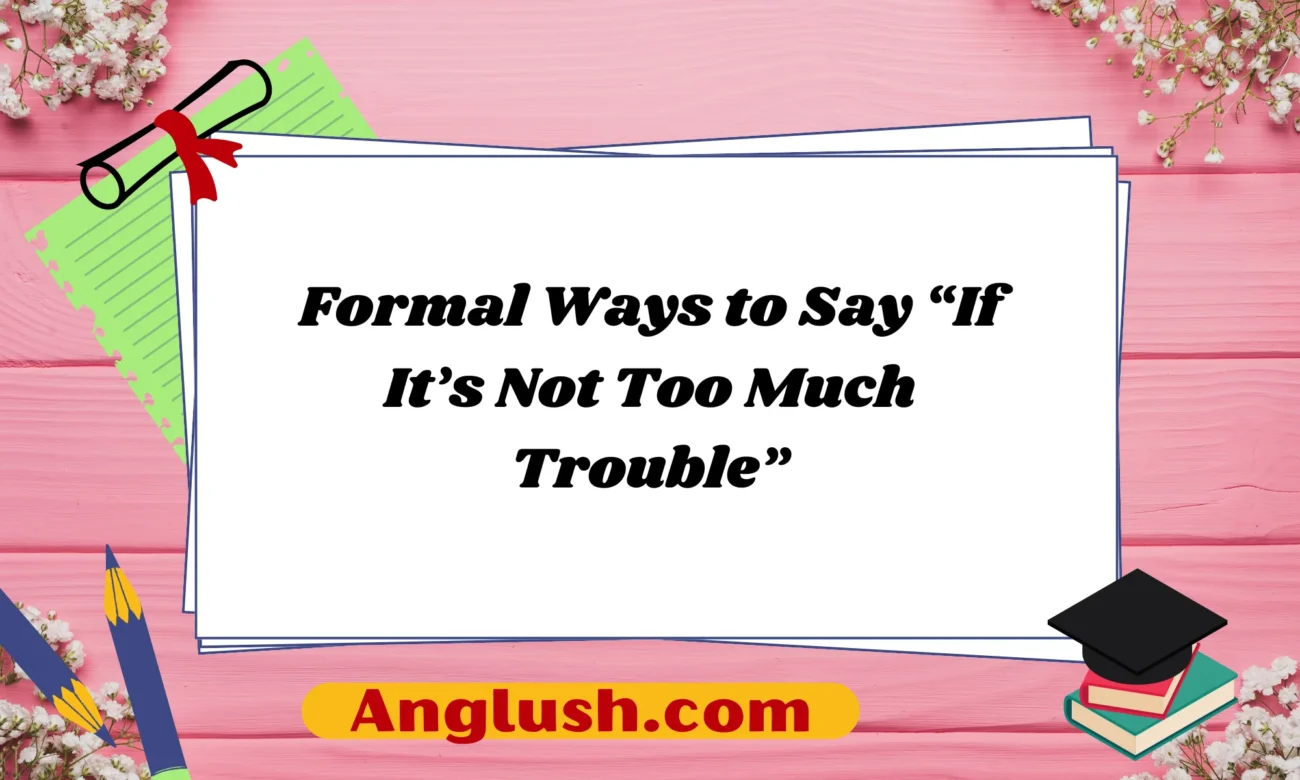Introduction
In both personal and professional communication, politeness is key when making requests. The phrase “If it’s not too much trouble” is commonly used to soften requests, ensuring they sound courteous rather than demanding. However, depending on the context—whether formal, semi-formal, or casual—there are numerous ways to phrase this sentiment.
In this article, we will explore 29+ alternative ways to say “If it’s not too much trouble.” These alternatives will help you refine your communication skills for emails, work settings, and everyday conversations. We’ll also provide 11 text-friendly examples and a meta description to ensure clarity and optimization.
Why Use Alternatives to “If It’s Not Too Much Trouble”?
While the phrase is polite and widely understood, using varied expressions can:
✅ Make your requests sound more professional or refined.
✅ Prevent overuse of common phrases.
✅ Suit different levels of formality.
✅ Align better with business etiquette or cultural expectations.
29+ Formal and Polite Alternatives to “If It’s Not Too Much Trouble”
1. Would You Be So Kind As To…
Example:
“Would you be so kind as to forward the document to me at your earliest convenience?”
👉 This phrase sounds elegant and professional, making it perfect for workplace emails or customer service interactions.
2. I Would Appreciate It If…
Example:
“I would appreciate it if you could review this report before the deadline.”
👉 This alternative is direct but still polite, making it useful for formal requests.
3. If You Wouldn’t Mind…
Example:
“If you wouldn’t mind, could you double-check the figures in this report?”
👉 This phrase softens a request while keeping it professional.
4. If It’s Convenient for You…
Example:
“If it’s convenient for you, we’d love to schedule a meeting this Friday.”
👉 This option is respectful of the other person’s schedule and works well in professional settings.
5. Whenever You Get a Chance…
Example:
“Whenever you get a chance, could you review my proposal?”
👉 This phrase conveys flexibility and patience in your request.
6. If Possible…
Example:
“If possible, could we move the meeting to next Monday?”
👉 This alternative keeps the request short and professional while allowing for flexibility.
7. I Hope It’s Not an Inconvenience, but…
Example:
“I hope it’s not an inconvenience, but could you send me the revised document?
👉 This phrasing acknowledges potential inconvenience while maintaining politeness.
8. If You Have a Moment…
Example:
“If you have a moment, could you explain the new process to me?”
👉 Ideal for quick requests that don’t require much effort from the recipient.
9. If It’s Feasible…
Example:
“If it’s feasible, could we schedule a follow-up meeting next week?”
👉 This phrase is useful in professional settings where feasibility is a key consideration.
10. If You Have Time…
Example:
“If you have time, I’d love to get your feedback on my presentation.”
👉 This option respects the recipient’s time and avoids sounding pushy.
11. At Your Convenience…
Example:
“Please send me the contract at your convenience.”
👉 This alternative is formal, polite, and widely used in business communication.
12. If It Wouldn’t Be Too Much to Ask…
Example:
“If it wouldn’t be too much to ask, could you assist me with this task?”
👉 A more elaborate way to phrase your request while maintaining courtesy.
13. If You Don’t Mind…
Example:
“If you don’t mind, could we discuss this matter further in our next meeting?”
👉 A simple and effective way to introduce a polite request.
14. Should You Have the Time…
Example:
“Should you have the time, please review the attached documents.”
👉 Sounds highly professional and works well in formal writing.
15. I Would Be Grateful If…
Example:
“I would be grateful if you could assist me with this matter.”
👉 This expression conveys appreciation and politeness simultaneously.
16. When You Have an Opportunity…
Example:
“When you have an opportunity, could you take a look at my application?”
👉 Works well for requests that are not urgent but still important.
17. If You Happen to Have Time…
Example:
“If you happen to have time, I would appreciate your insights on this project.”
👉 A soft and indirect way to make a request.
18. If You Find It Convenient…
Example:
“If you find it convenient, please send over the updated files.”
👉 A polite way to consider the recipient’s availability.
19. I’d Be Obliged If…
Example:
“I’d be obliged if you could provide me with an update by tomorrow.”
👉 This phrase is slightly formal and less commonly used today but still effective.
20. If You Deem It Possible…
Example:
“If you deem it possible, please approve the budget increase.”
👉 Sounds highly professional and works well in business settings.
21. If Circumstances Allow…
Example:
“If circumstances allow, we’d appreciate an extension on the deadline.”
👉 A considerate phrase that acknowledges external constraints.
22. Should You Be Available…
Example:
“Should you be available, we’d love to meet this Friday.”
👉 A formal yet flexible phrasing option.
11 Texting Examples for Everyday Use
- “Hey, if you have a sec, could you call me?”
- “If it’s cool with you, could we reschedule?”
- “Whenever you get a chance, could you send me that link?”
- “Would you mind grabbing some coffee on your way?”
- “If possible, could you send me the meeting notes?”
- “Hope it’s not a bother, but could you check the email I sent?”
- “If you wouldn’t mind, can we talk later?”
- “At your convenience, could you confirm the details?”
- “If you have time today, let’s catch up!”
- “Whenever you’re free, let me know!”
- “If you happen to be near the store, could you pick up some milk?”
Conclusion
Using alternative phrases to “If it’s not too much trouble” helps enhance communication by sounding more professional, polite, and adaptable to different contexts. Whether you’re sending an email, making a business request, or just texting a friend, choosing the right wording can make your message more effective.

